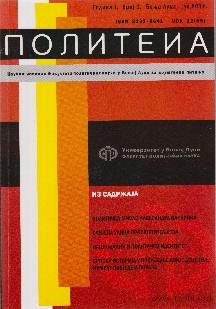Република Србија као вишенационална и вишеконфесионална држава
Serbia as a Multi-National and Multi-Confessional State
Author(s): Darko TanaskovićSubject(s): Civil Society, Government/Political systems, Inter-Ethnic Relations, Sociology of Politics, Politics and Identity, Identity of Collectives
Published by: Fakultet političkih nauka Univerziteta u Banjoj Luci
Keywords: Multi-confessionality; Multi-nationality; democracy; rule of law; stabilization; Serbia; nationality;
Summary/Abstract: Serbia, which is one of the founders of Yugoslavia, went, during the 1990-s of the last century, along with the other Yugoslav republics and nationalities, through the trials and tribulations of the disintegration of the federal state which was followed by social and political upheavals, as well as civil war fighting between the ethnic groups. Even though they aimed to keep Yugoslavia together, the Serbian people and its political elite were declared the main culprits of its breakup and the cause of the war tragedy that ensued. As an independent state, Serbia, in post-communist conditions, aspires to harmonize the principles of democracy, human, civil and all other rights with the reality of its multi-national and multi-confessional composition. The contradictions are still very considerable, while the system still doesn’t operate in a satisfactory manner, but there have been very significant progress in the task of rationalizing the political spectrum. The social and political trends in Serbia will in a very critical way depend on the open perspective and the pace by which it is admitted to the EU.
Journal: Politeia - Naučni časopis Fakulteta političkih nauka u Banjoj Luci za društvena pitanja
- Issue Year: 1/2011
- Issue No: 1
- Page Range: 79-94
- Page Count: 16
- Language: Serbian

